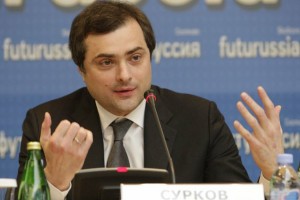
Though not commonly associated with political movements, the philosophy of postmodernism is becoming increasingly apparent in geopolitics and now seems to be penetrating circles of establishment and anti-establishment figures alike from the United States to Russia. The result is a general state of confusion and even destabilization, according to a BBC documentary and an “inner game” life coach who spoke with FreeManPost.
Just over the past year, the terms post-truth and fake news have become daily lingo in political discussions and media reports. Oxford Dictionaries even selected post-truth as the word of the year in 2016. Post-truth, as defined by Oxford, is “relating to or denoting circumstances in which objective facts are less influential in shaping public opinion than appeals to emotion.”

Similarly, postmodernism largely entails a rejection of objectivity. That can come in many forms, including rejecting the concept of objective truth and rejecting beliefs that are seemingly universally held.
While Oxford Dictionaries and major western media largely finger the Brexit movement and U.S. President Donald Trump as being responsible for a growing rejection of objective facts, postmodern ideas are apparent in a variety of political circles. For instance, the social justice culture in the West deconstructs the concepts of gender, sex, sexuality, race and so on, replacing traditional definitions and understandings of the terms with endless variations and possibilities.
In an interview with FreeManPost, Shae Matthews, the “inner game” coach for the men’s lifestyle company The Natural Lifestyles, discussed the role of postmodernism in society as well as in geopolitics.
Matthews, who has a background in fields ranging from massage therapy to philosophy to neuro-linguistic programming (NLP), says there are positive and negative attributes of postmodernism. Matthews said postmodern deconstruction of grand ideas can empower the individual with a belief that “everything is possible,” but postmodernism can also lead to too much meaninglessness
In the realm of geopolitics, postmodernism is creating considerable confusion, Matthews said.
“We live in times where there is a lot of complexity going on on a lot of different levels. So, it’s almost very hard to have any real clear opinion about anything in particular because there are just so many moving pieces that are happening on so many different levels,” Matthews said.
As an example of postmodernism causing confusion, Matthews referenced Vladislav Surkov, the former deputy prime minister of Russia and longtime aide to Russian President Vladimir Putin. Surkov, who took theater courses at the Moscow Institute of Culture, is credited in a BBC documentary with having blended theater and politics to sow division and confusion among Russian opposition groups and citizens at large, all for the benefit of Putin.

“Putin has been very influenced by another character that’s his right-hand man who is actually a theater producer, so it’s kind of like his job to actually create stories, to create the stories, the themes and the propaganda,” Matthews said of Surkov. “In some sense the feeling that I get is he’s very much a kind of postmodern magician… creating these stories and creating these frameworks that are actually designed to destabilize the public.”
In the 2016 BBC documentary Hypernormalisation, British filmmaker Adam Curtis alleged Surkov used Kremlin funds to sponsor groups ranging from neo-Nazis to liberal human rights advocates to formal political parties opposing Putin. Surkov even publicly acknowledged what he was up to, Curtis said.
“Surkov turned Russian politics into a bewildering, constantly changing piece of theater,” Curtis said in the documentary. “His aim is to undermine people’s perception of the world, so they never know what is really happening.”
The documentary went on to discuss Russia’s actions in Ukraine and how Surkov published a short-story about non-linear warfare, stating one never knows what the enemy is up to or who the enemy is. Curtis cited Surkov as saying non-linear warfare creates the constant perception of destabilization.
Curtis also accuses Trump of acting in a similar fashion as Surkov. Curtis alleges both Surkov and Trump came to the realization that the way in which politics had been presented was no longer believable. They then figured out they could play with reality and twist it in order to seize power. In the case of Trump, his barrage of often-inaccurate comments overwhelmed the fact-checking fortitude of traditional journalism, Curtis alleged.
Curtis also accuses other western officials, i.e. George Osborne, the British politician-turned editor of the London Evening Standard, of using postmodern tactics to confuse the public and keep power and wealth in the hands of western elites.
Osborne is currently in attendance at the Bilderberg Conference, which is kicking off Thursday in Chantilly, Virginia. The conference is a yearly gathering of western elites from business and politics who belong to or are associated with the secretive Bilderberg Group.
RELATED: WHAT IS THE BILDERBERG GROUP?
In the case of this year’s Bilderberg Conference, there are multiple postmodern narratives surrounding the event. For one, the group is an enigma. Bilderberg conferences are multi-day gatherings of some of the richest and most powerful people in the world — including monarchs, Fortune 500 CEOs and heads of government — yet they receive next to no coverage in major western media. Not even the journalists who attend Bilderberg meetings report what happens on the inside.
Critics allege Bilderberg is an organization of kingmakers that is influential in getting presidents and prime ministers elected and was instrumental in the creation of the European Union and the euro currency. Yet the Bilderberg website, the group’s official press organ, is an innocent looking page that contains an agenda and a participants’ list. Participants say the meetings are not secret, but rather private, in order to ensure frank discussions. The general public — if it is even aware the meetings are taking place — does not know whom to believe.
The first item on the 2017 Bilderberg Conference agenda is a progress report on the Trump Administration. Bilderberg and the Trump Administration could very well come across as opposing political forces. Trump railed against globalization on the campaign trail, and while since backtracking on several issues, he has killed the Trans-Pacific Partnership trade deal, tussled with NATO allies and, as of Thursday, is pulling the U.S. out of the Paris climate agreement. Bilderberg and its members, on the other hand, are leading proponents of globalization, the Euro-Atlantic alliance and increased global governance.
But simultaneously, Bilderberg and the Trump Administration are forging ties with one another. Attendees at this year’s conference include H.R. McMaster, Trump’s national security advisor, Wilbur Ross, Trump’s commerce secretary; and Chris Liddell, who holds the title of Assistant to the President and Director of Strategic Initiatives. Additionally, the most prominent member of the Bilderberg Group, former U.S. Secretary of State Henry Kissinger, met with Trump at the White House earlier this month. Likewise, with the conference taking place just miles away from Pennsylvania Avenue, there is some speculation Trump will actually show up.
Is there an objective truth about what the Bilderberg Group is and what its aims are? How about the group’s relationship with Trump — who recently changed his tune and said he is both a nationalist and a globalist. Are Bilderberg members trying to woo Trump or control him, or are they already cooperating, or are they bitterly opposed to one another? Likewise, could Bilderberg and/or Trump be sowing confusion in similar fashion to Surkov? These are some of the questions that arise when deconstructing the shadowy gathering.
Further down the Bilderberg agenda is an item titled “The war on information.” What does that mean? In geopolitical discussions, it is now common to hear the term information war. But what is the war on information? Are fake news and post-truth politics destroying information? Or could they be chipping away at support for the global order Bilderberg promotes?
Anyway, what is fake news? CNN calls out Trump-friendly media as fake news, and Trump calls out CNN as fake news. Meanwhile, the president of Turner International, Gerhard Feiler, whose job is to oversee CNN, is in attendance at Bilderberg. Will CNN run any news on the secretive conference its boss is attending?
Or will the news network’s viewers be left in an “existential emptiness” — a state the “inner game” master Matthews found himself in after embarking upon a journey of too much postmodern deconstructionism.
